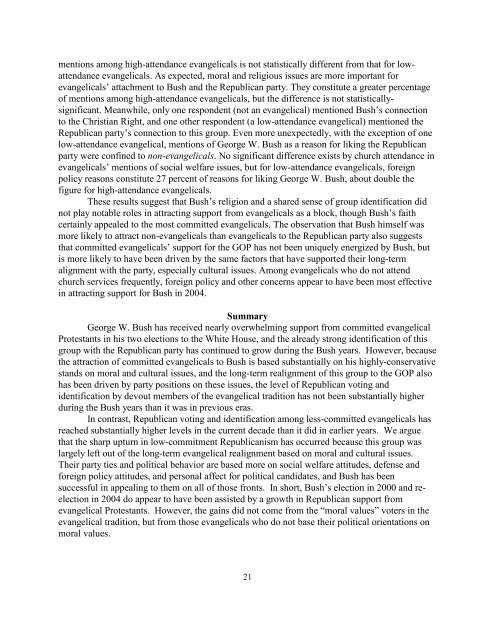George W Bush and the Evangelicals
George W. Bush and the Evangelicals: - Rooney Center - University ...
George W. Bush and the Evangelicals: - Rooney Center - University ...
- No tags were found...
Create successful ePaper yourself
Turn your PDF publications into a flip-book with our unique Google optimized e-Paper software.
mentions among high-attendance evangelicals is not statistically different from that for lowattendance<br />
evangelicals. As expected, moral <strong>and</strong> religious issues are more important for<br />
evangelicals’ attachment to <strong>Bush</strong> <strong>and</strong> <strong>the</strong> Republican party. They constitute a greater percentage<br />
of mentions among high-attendance evangelicals, but <strong>the</strong> difference is not statisticallysignificant.<br />
Meanwhile, only one respondent (not an evangelical) mentioned <strong>Bush</strong>’s connection<br />
to <strong>the</strong> Christian Right, <strong>and</strong> one o<strong>the</strong>r respondent (a low-attendance evangelical) mentioned <strong>the</strong><br />
Republican party’s connection to this group. Even more unexpectedly, with <strong>the</strong> exception of one<br />
low-attendance evangelical, mentions of <strong>George</strong> W. <strong>Bush</strong> as a reason for liking <strong>the</strong> Republican<br />
party were confined to non-evangelicals. No significant difference exists by church attendance in<br />
evangelicals’ mentions of social welfare issues, but for low-attendance evangelicals, foreign<br />
policy reasons constitute 27 percent of reasons for liking <strong>George</strong> W. <strong>Bush</strong>, about double <strong>the</strong><br />
figure for high-attendance evangelicals.<br />
These results suggest that <strong>Bush</strong>’s religion <strong>and</strong> a shared sense of group identification did<br />
not play notable roles in attracting support from evangelicals as a block, though <strong>Bush</strong>’s faith<br />
certainly appealed to <strong>the</strong> most committed evangelicals. The observation that <strong>Bush</strong> himself was<br />
more likely to attract non-evangelicals than evangelicals to <strong>the</strong> Republican party also suggests<br />
that committed evangelicals’ support for <strong>the</strong> GOP has not been uniquely energized by <strong>Bush</strong>, but<br />
is more likely to have been driven by <strong>the</strong> same factors that have supported <strong>the</strong>ir long-term<br />
alignment with <strong>the</strong> party, especially cultural issues. Among evangelicals who do not attend<br />
church services frequently, foreign policy <strong>and</strong> o<strong>the</strong>r concerns appear to have been most effective<br />
in attracting support for <strong>Bush</strong> in 2004.<br />
Summary<br />
<strong>George</strong> W. <strong>Bush</strong> has received nearly overwhelming support from committed evangelical<br />
Protestants in his two elections to <strong>the</strong> White House, <strong>and</strong> <strong>the</strong> already strong identification of this<br />
group with <strong>the</strong> Republican party has continued to grow during <strong>the</strong> <strong>Bush</strong> years. However, because<br />
<strong>the</strong> attraction of committed evangelicals to <strong>Bush</strong> is based substantially on his highly-conservative<br />
st<strong>and</strong>s on moral <strong>and</strong> cultural issues, <strong>and</strong> <strong>the</strong> long-term realignment of this group to <strong>the</strong> GOP also<br />
has been driven by party positions on <strong>the</strong>se issues, <strong>the</strong> level of Republican voting <strong>and</strong><br />
identification by devout members of <strong>the</strong> evangelical tradition has not been substantially higher<br />
during <strong>the</strong> <strong>Bush</strong> years than it was in previous eras.<br />
In contrast, Republican voting <strong>and</strong> identification among less-committed evangelicals has<br />
reached substantially higher levels in <strong>the</strong> current decade than it did in earlier years. We argue<br />
that <strong>the</strong> sharp upturn in low-commitment Republicanism has occurred because this group was<br />
largely left out of <strong>the</strong> long-term evangelical realignment based on moral <strong>and</strong> cultural issues.<br />
Their party ties <strong>and</strong> political behavior are based more on social welfare attitudes, defense <strong>and</strong><br />
foreign policy attitudes, <strong>and</strong> personal affect for political c<strong>and</strong>idates, <strong>and</strong> <strong>Bush</strong> has been<br />
successful in appealing to <strong>the</strong>m on all of those fronts. In short, <strong>Bush</strong>’s election in 2000 <strong>and</strong> reelection<br />
in 2004 do appear to have been assisted by a growth in Republican support from<br />
evangelical Protestants. However, <strong>the</strong> gains did not come from <strong>the</strong> “moral values” voters in <strong>the</strong><br />
evangelical tradition, but from those evangelicals who do not base <strong>the</strong>ir political orientations on<br />
moral values.<br />
21


